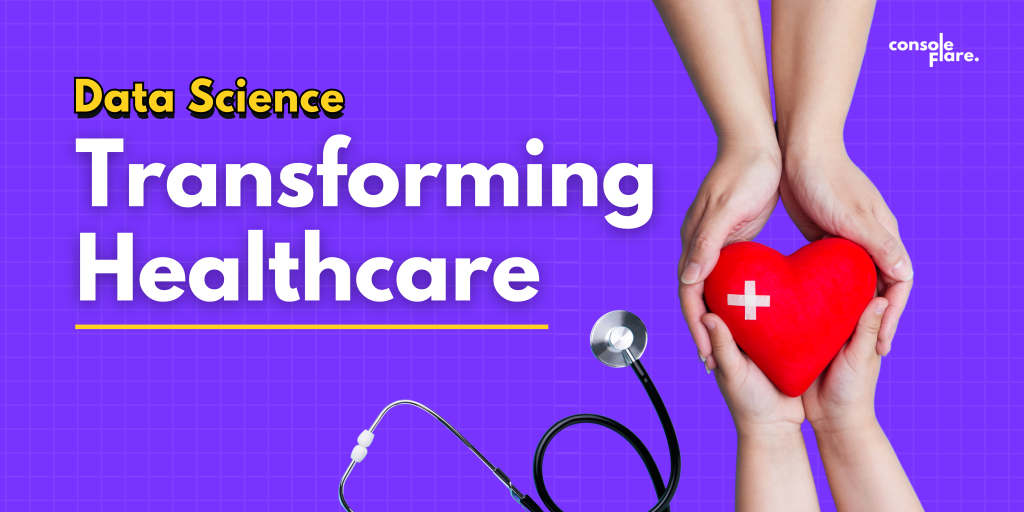Data science is making a good move in the healthcare industry like never before. In combination with Advanced analytics, Machine learning, and Big data healthcare professionals are giving more customized and effective treatment. Predictive analysis helps them for early diagnosis. AI helps with new drug discoveries. In this article, we will explore a wide range of applications and advantages of data science in healthcare, while also discussing the challenges and also what are the future aspects. Data science helps find important insights with a combination of statistics, machine learning algorithms, and data analysis from complex datasets. In healthcare, perform analysis on patient record data, clinical trial data, and genetic information data. Let’s see how it is making a drastic change in health care.
How Data Science making a drastic change in Health Care?
- Predictive Analytics for Early Diagnosis
- Tailored treatment
- Better Clinical Decisions
- Efficient Operations and Cost Savings
- Drug Discovery and Development
- Medical Imaging
- Epidemiology and Public Health
- AI-Enhanced Diagnostics
- Blockchain for Data Protection
- Wearable Technology and Remote Monitoring
- Managing Population Health
1. Predictive Analytics for Early Diagnosis
In Predictive analysis, you can forecast the chance of disease before they show some symptoms. Machine learning models can specify the early indicators of chronic illnesses like diabetes and hypertension. With the help of predictive tools, you can detect early-stage cancer. With this, you can take precautions, and timely interventions and cut down the healthcare costs.
2. Tailored treatment
With the help of Data science healthcare is now moving towards personalized treatment based on a patient’s unique genetic data, lifestyle, and medical history. By analyzing genetic data you can spot specific mutations which cause certain illnesses. Data science Algorithms can recommend customized treatment plans that are more effective with fewer side effects.
3. Better Clinical Decisions
Data science provides a decision support system by analyzing patient’s records, lab results, and live data. It gives proof-based advice For example AI tools suggest dosage for particular patients. Predictive tools warn doctors about the possibilities of bad drug reactions. This information reduces the chances of mistakes as well as you can improve safety more efficiently.
4. Efficient Operations and Cost Savings
Data science improves operational efficiency by forecasting patient admission and optimizing resource usage. Supply chain analysis reduces the waste in pharmaceutical stocks. Automate billing and patient scheduling. All these processes are cost-effective.
5. Drug Discovery and Development
The traditional process of new drug discovery is costly and lengthy. Data science increases the speed by leveraging Machine learning to spot potential drugs from extensive chemical libraries. Data science provides advancement, shortens the time to bring new drugs into the market, and reduces research and development costs.
6. Medical Imaging
Data Science took steps in radiology diagnostics imaging in remarkable ways by effectively identifying abnormalities in X-rays, MRI, and CT scans. It reduces the workload of health professionals by providing timely and precise information.
7. Epidemiology and Public Health
Data Science is important to understand and manage disease outbursts. By inspecting social media and data movement experts can forecast the symptoms of a disease like how infectious it is as COVID-19. On the basis of analysis, analysts can categorize the people who are at higher risk and who are in the safe zone. With the help of this information, anyone can track and control the spread of disease.
8. AI-Enhanced Diagnostics
AI systems very soon will be able to understand unstructured data like doctor’s notes and research papers with the help of natural language processing and deep learning. This will come up with accuracy and efficiency in diagnosing disease. AI will help to quickly find information about the patient’s health which will lead to better treatment and improved patient care.
9. Blockchain for Data Protection
Blockchain technology has the power to modify data sharing and security within the healthcare sector. It will stop unauthorized data access. It will provide a high level of security and integrity of patients’ records.
10. Wearable Technology and Remote Monitoring
Fitness trackers and smartwatches help to monitor health. These gadgets create real-time health data. With the help of data science, they continuously monitor heart rate, blood pressure, and glucose levels. By recording any abnormal activity it immediately gives an alert to the users. Prompt treatment can be provided by these alerts for chronic disease. By continuous evaluation of these data, doctors can get important information about the patient’s health.
11. Managing Population Health
Data science gives the correct picture of the population. By analyzing large datasets of health data it can recognize patterns. This helps to specify which population is at more risk for certain diseases. With these insights healthcare providers and strategy makers can take the initiative to find a way for everyone to achieve better health.
Conclusion
Data science leaves a major impact on healthcare through continuous innovation, improving patient care, and efficient operations. It helps healthcare providers to make better decisions at low cost. Predictive analysis helps to take immediate action and prevent the disease before it gets serious. You can learn Data science by enrolling with Console flare.
For more such content and regular updates, follow us on Facebook, Instagram, LinkedIn

